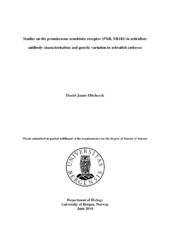Studies on the promiscuous xenobiotic receptor (PXR, NR1I2) in zebrafish: antibody characterisation and genetic variation in zebrafish embryos
Master thesis
Permanent lenke
https://hdl.handle.net/1956/8340Utgivelsesdato
2014-06-02Metadata
Vis full innførselSamlinger
Sammendrag
The promiscuous xenobiotic receptor (PXR, NR1I2, also denoted pregnane X receptor) is a nuclear receptor which regulates the transcription of genes involves in the biotransformation of endogenous and xenobiotic compounds. PXR is activated by ligands including steroids, natural products, as well as drugs and pollutants, making it an important subject of research in a pharmacological and ecotoxicological context. One method of studying this nuclear receptor is through the use of high quality, specific antibodies which can immunochemically detect the protein. In the first part of this study, the immunoreactivity of hybridoma supernatants obtained from cells of mice immunised with either human PXR (hPXR, Homo sapiens) or zebrafish Pxr (zfPXR, Danio rerio), suspected to contain monoclonal antibodies specific to each PXR ortholog, were tested against eukaryotically expressed hPXR and zfPXR, as well as prokaryotically expressed zfPXR. Hybridoma supernatants from mice immunised with hPXR were found to be immunoreactive against the hPXR antigen, however some of these supernatants were immunoreactive with an additional protein that was heavier than the PXR antigen. Hybridoma supernatants from mice immunised with zfPXR were not found to be immunoreactive against either eukaryotically or prokaryotically expressed zfPXR antigen. In a second aspect of this study, research has identified allelic variants in the amino acid sequence of zfPXR and this could have implications on the nuclear receptor's ability to function. A method for extracting RNA from individual zebrafish embryos was established in our laboratory, and pxr was sequenced from individuals (n = 24). However no genetic variation was found in this sample set, compared to what has been identified in literature and to online databases.
